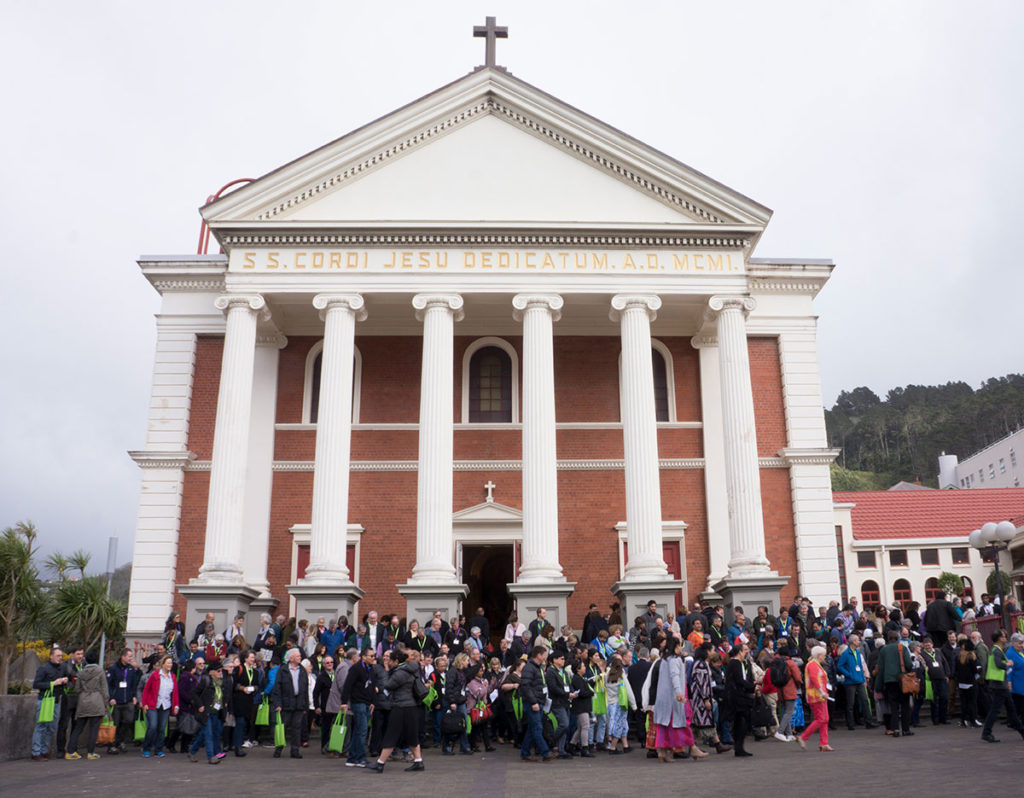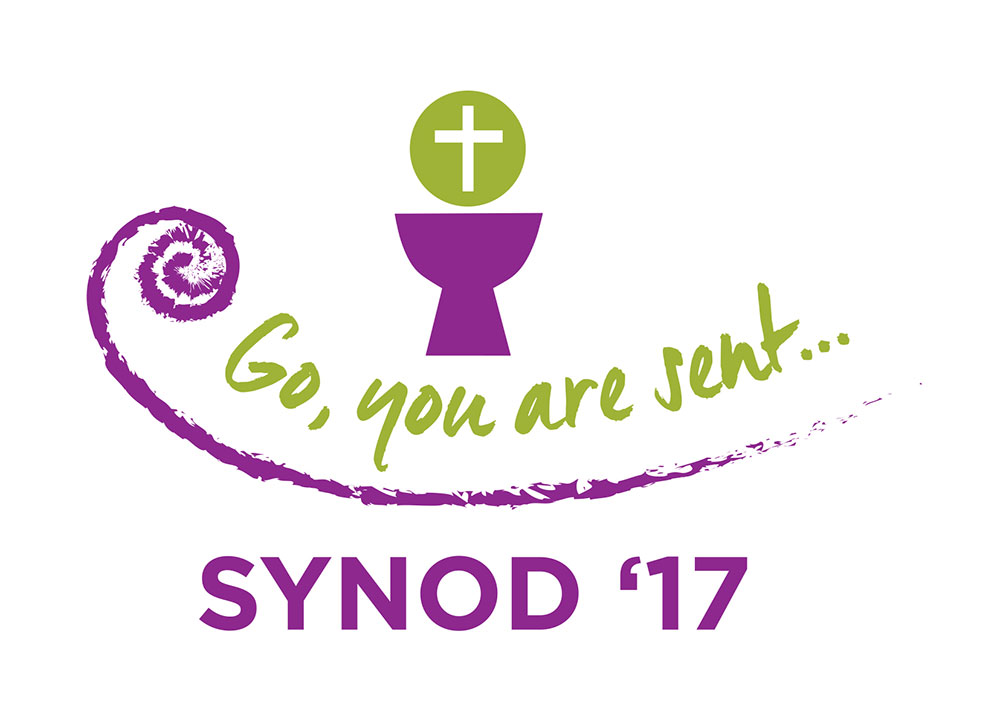WelCom December 2019
Anne Dickinson

Photo: WelCom
Most parishes in the Archdiocese provided their proposals about their parish property to Cardinal John Dew on 31 October 2019 as requested. A couple of parishes have been given short extensions to the timeframe.
The proposals were prepared in response to the letter Cardinal John sent to parishes in February this year about parish property assets, and specifically churches and presbyteries. In that memo, he outlined the pressures on the Archdiocese from earthquake resilience issues, the smaller number of priests and the need to respond to the missionary priorities identified by the 2017 Archdiocesan Synod. He asked parishes to review their property assets, taking into account Mass counts, demographic factors, and earthquake-resilience issues, and to consult with parishioners and neighbouring parishes as part of the review.
‘I am very aware the process of preparing the proposals has not been easy, and that in some parishes it has been profoundly unsettling,’ Cardinal John said. ‘It has taken a personal toll on parish leaders and on parishioners. But we must respond to Pope Francis’ repeated calls to organise ourselves for mission, not for maintenance.’
Cardinal John has taken advice from the Council of Priests about the process for dealing with the proposals. Between now and early February 2020, he will study and reflect upon the them, seeking clarification or additional information if needed. His approach will be pastoral, looking at the possible effects on people of the changes being proposed. Cardinal John will also look carefully at how one parish’s proposals might interact with those of neighbouring parishes, and the implications the proposals have together for the whole Archdiocese.
In February and March next year, Cardinal John will consult with his advisory bodies about the proposals. These bodies include the Council of Priests, the Archdiocesan Pastoral Council, Te Kahu o te Rangi, and the Board of Administration. Cardinal John said he hopes to be in a position after Easter to advise parishes of his response to the proposals, or to ask that further steps be taken, for example, discussion at regional levels in the Archdiocese.
Cardinal John has stressed that when he considers the proposals he will not be making a decision to ‘approve’ them. His response to a proposal will be expressed as:
- ‘no objection’;
- ‘further work needed’; or
- ‘opposed’.

While the proposals were being worked on in parishes there has been a ‘hold’ on property proposals being presented to or decided by the Board of Administration. This hold continues until Cardinal John has made a response to all parishes and notifies if the hold has been lifted. This hold includes property decisions that may already be in the early stages of the Board of Administration’s processes.
It would then be the parish’s decision to actually proceed with a proposal if Cardinal John has no objection. Once the parish decides to proceed, its decisions will be subject to the usual archdiocesan norms and approval processes.
‘We have not yet come through this difficult and unsettling process,’ says Cardinal John. ‘But I would like everyone to now put aside differences and concerns and focus together on the great liturgical seasons and feasts of the next few months ‒ Advent, Christmas, Lent and Easter.
‘In doing this we have the opportunity to encounter Jesus and one another more deeply and be refreshed in our commitment to both community and mission.’
Catholic Archdiocese of Wellington – Advisory Bodies
The Canon Law of the Catholic Church requires the bishop of a diocese to have advisory bodies, often referred to as Diocesan Councils. These advisory bodies are structures which ‘guarantee a dimension of communion in the pastoral governance of the Bishop, insofar as they generate a kind of reciprocal interplay between what a bishop is called to contribute to the good of the diocese through exercising his personal responsibility, and the contribution made through the collaboration of all the faithful.’ – Apostolorum Successores 165
Board of Administration
The Board of Administration assists the Archbishop and the Finance and Administration Department to fulfil the vision of the Archbishop through the stewardship and provision of financial, property and administrative services to the Archdiocese, parishes and Church agencies. The Board of Administration is committed to developing and sustaining interdependent and respectful relationships so that the Gospel may be promoted in the work of the Archdiocesan Departments, Boards, Councils and other Archdiocesan Agencies.
Archdiocesan Pastoral Council
The Archdiocesan Pastoral Council is made up of people from different parts of the Archdiocese who together represent its parishes, ethnic diversity and many ministries.
The Pastoral Council aims to:
- pray for the Archdiocese, grow in faith and develop an understanding of Church governance;
- advise and assist the Archbishop in formulating and implementing a vision for the Archdiocese derived from the Gospel, based in the pastoral realities of the people and parishes;
- help parishes, chaplaincies and lay groups foster a spirit of participation, collaboration and unity;
- assist the Archbishop in presenting and representing the Church in the world as the universal sign of salvation.
Council of Priests
The Council of Priests represents the clergy and advises the Archbishop on a wide variety of matters to do with the Archdiocese. The Council assists the Archbishop in the governance of the Archdiocese to promote the pastoral wellbeing of the people of the Archdiocese and the priests’ welfare.
College of Consultors
From among the members of the Council of Priests the Archbishop appoints a small group as consultors. They have certain responsibilities in relation to major decisions about assets, and they act as an interim governance body if the diocese has no bishop.
Te Kahu o te Rangi
Te Kahu o te Rangi (TKOTR) is the Māori Pastoral Council in the Archdiocese. Membership is open to all Catholic Māori and their communities within the Archdiocese. One of the main activities for members is to report back to TKOTR on initiatives in their particular parish and rohe (area). For example:
- sacramental programmes – Baptisms and Holy Communion
- pastoral activities – home and hospital visits
- assisting with liturgies in parishes communities – hīmene, karakia, karanga.
TKOTR meets in February, May, August and November each year. The first hui for 2020 will be the first Sunday in February.
He pānui, he pōwhiri tēnei kia hui tahi tāou ki te kāinga Katorika o Pukekaraka, ki a Hinenui-o-te-ao-katoa. Nau mai, whakatau mai rā.
Nau mai, haere mai.
Source: www.wn.catholic.org.nz/about/archbishop/advisory-bodies/ and www.wn.catholic.org.nz/about/maori-pastoral-care-team/